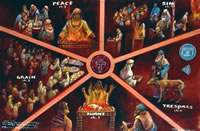
IN THE COURTYARD, THE BURNT ALTAR, 1-7. The burnt, grain, and peace offerings were voluntary, reflecting man’s love to God. The sin and trespass offerings were mandatory, showing man to be a sinner. The victims were offered on the altar in the sinner’s place. The way to God was by sacrifice.
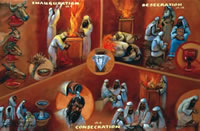
IN THE COURTYARD, THE LAVER, 8-10. The high priest carried the nation on his shoulders and his heart. He constantly washed sin’s defilement from his hands and feet. As a mediator, he represented man before God. Jesus Christ is our mediator whose blood cleanses from all sin.
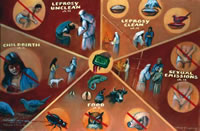
IN THE HOLY PLACE, 11-15. God sets the rules for eating bread at His table, in seeing life in the light of His standard, and standing undefiled in the sweet aroma at His altar. Sin is exceedingly sinful. He who comes to God must be separated unto God and be separated from sin.
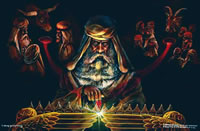
IN THE HOLY OF HOLIES, 16. Once a year Aaron sprinkled the blood of a bull to cover his own sin. The two goats constituted one sin offering. The victim took the sinner’s penalty. Then he sprinkled the goat’s blood for the people. God declared that the blood atoned for their sin.
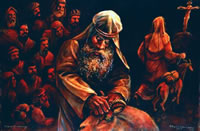
THE SCAPEGOAT, 16. Aaron laid his hands on the head of the goat selected to live. It symbolized a transfer of an obligation to suffer for sin, from the sinner to the innocent victim. The goat was then led outside the camp, bearing sin away, until the next year, when atonement was repeated.
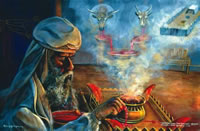
BLOOD ON THE HORNS OF THE ALTAR, 16. The blood of the bull and goat were mixed together and sprinkled on the horns of the altars. All places for drawing nigh to God were covered by blood, though God never accepted the blood of bulls and goats as the final payment for sin.
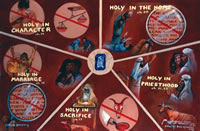
SERVICE AT THE BURNT ALTAR, 17-22. Through obedience to God, the redeemed sinner maintained fellowship with God. Because of God’s mercy the innocent victim was consumed and not the sinner. God wants His people to be holy, for they are His exclusive possession.
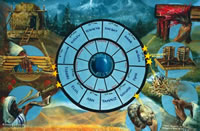
LIVING IN THE PROMISED LAND, 23. Leaving Mount Sinai, they would soon be in Canaan. God gave the nation a religious calendar to maintain fellowship with Him. In three annual pilgrimages up to Jerusalem, they kept seven feasts. The Sabbath is the pendulum that keeps God’s clock ticking.
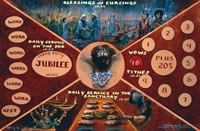
IN THE PROMISED LAND, 24-27. God’s standard of “holiness unto the LORD” emphasized a broken spirit and a contrite heart. They were to keep all His commandments. He would keep them in the land if they obeyed, but if they failed, He would scatter them in the Diaspora, but not forever.
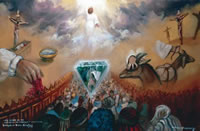
DOING THE WORK OF GOD. Leviticus details the work that a sinner must do to be blessed by God. His inability to fulfill the law gave him no rest and humbled the contrite of heart to trust in the work of Christ. Jesus taught that our “work” is to believe on Him, for He alone gives access to the Father in Heaven.